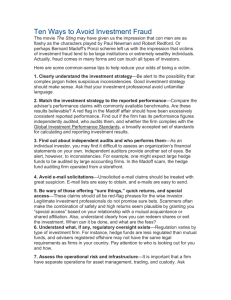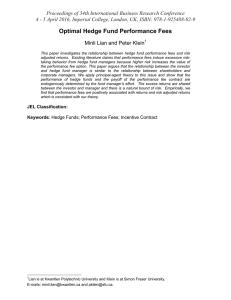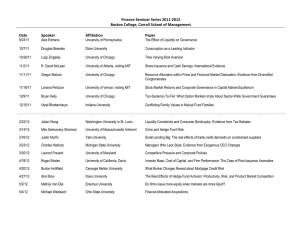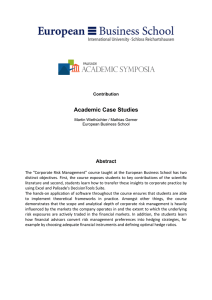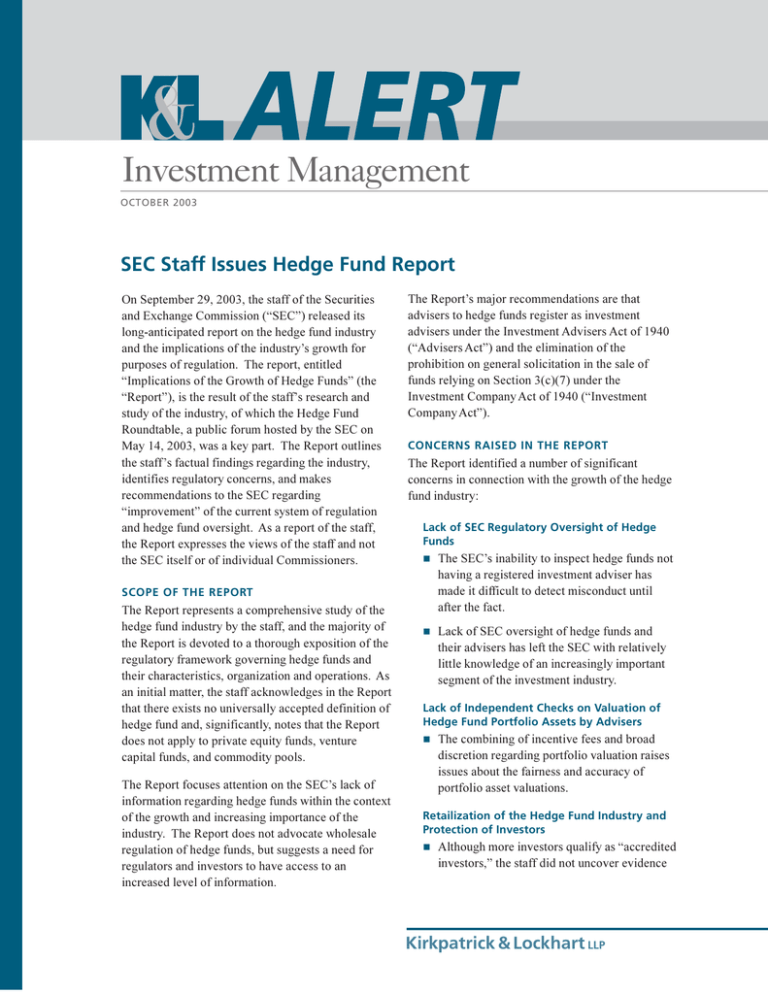
Investment Management
OCTOBER 2003
SEC Staff Issues Hedge Fund Report
On September 29, 2003, the staff of the Securities
and Exchange Commission (SEC) released its
long-anticipated report on the hedge fund industry
and the implications of the industrys growth for
purposes of regulation. The report, entitled
Implications of the Growth of Hedge Funds (the
Report), is the result of the staffs research and
study of the industry, of which the Hedge Fund
Roundtable, a public forum hosted by the SEC on
May 14, 2003, was a key part. The Report outlines
the staffs factual findings regarding the industry,
identifies regulatory concerns, and makes
recommendations to the SEC regarding
improvement of the current system of regulation
and hedge fund oversight. As a report of the staff,
the Report expresses the views of the staff and not
the SEC itself or of individual Commissioners.
The Reports major recommendations are that
advisers to hedge funds register as investment
advisers under the Investment Advisers Act of 1940
(Advisers Act) and the elimination of the
prohibition on general solicitation in the sale of
funds relying on Section 3(c)(7) under the
Investment Company Act of 1940 (Investment
Company Act).
CONCERNS RAISED IN THE REPORT
The Report identified a number of significant
concerns in connection with the growth of the hedge
fund industry:
Lack of SEC Regulatory Oversight of Hedge
Funds
n
The SECs inability to inspect hedge funds not
having a registered investment adviser has
made it difficult to detect misconduct until
after the fact.
n
Lack of SEC oversight of hedge funds and
their advisers has left the SEC with relatively
little knowledge of an increasingly important
segment of the investment industry.
SCOPE OF THE REPORT
The Report represents a comprehensive study of the
hedge fund industry by the staff, and the majority of
the Report is devoted to a thorough exposition of the
regulatory framework governing hedge funds and
their characteristics, organization and operations. As
an initial matter, the staff acknowledges in the Report
that there exists no universally accepted definition of
hedge fund and, significantly, notes that the Report
does not apply to private equity funds, venture
capital funds, and commodity pools.
The Report focuses attention on the SECs lack of
information regarding hedge funds within the context
of the growth and increasing importance of the
industry. The Report does not advocate wholesale
regulation of hedge funds, but suggests a need for
regulators and investors to have access to an
increased level of information.
Lack of Independent Checks on Valuation of
Hedge Fund Portfolio Assets by Advisers
n
The combining of incentive fees and broad
discretion regarding portfolio valuation raises
issues about the fairness and accuracy of
portfolio asset valuations.
Retailization of the Hedge Fund Industry and
Protection of Investors
n
Although more investors qualify as accredited
investors, the staff did not uncover evidence
Kirkpatrick & Lockhart LLP
of significant numbers of retail investors
making direct investments in hedge funds.
n
n
The staffs concern about protecting retail
investors is, however, amplified by the
possibility that in the future retail investors
may be offered indirect access to hedge funds
through funds of hedge funds (FOHF) that
are registered under the Investment Company
Act. In particular, the staff notes concerns over
the reliability of such funds calculation of net
asset value due to lack of transparency. Lack
of transparency also may increase risks related
to a registered FOHFs lack of actual, as
opposed to intended, diversification.
Increased institutional investment in hedge
funds indirectly exposes participants in pension
plans and similar vehicles to otherwise
unregulated investments.
Hedge Funds are not subject to Any Minimum
Disclosure Requirements
Conflicts of Interest
n
Side-by-side management of hedge funds and
other accounts may cause conflicts due to
hedge fund incentive fees and conflicts in share
selling strategies, which could cause an adviser
to favor hedge fund clients over other clients.
n
The lack of disclosure relating to the payment
of fees and provision of services by prime
brokers to hedge funds may mask conflicts.
Compliance with General Solicitation
Requirements in Private Offerings
n
Marketing practices of some advisers,
especially in use of the internet, raise concerns
that the prohibition against general solicitation
in a private offering of securities is not being
rigorously observed.
Concerns Over Whether Current Laws and
Regulations Impair the Ability of Registered
Investment Companies to Utilize Hedge-like
Strategies
n
The staff is concerned that certain restrictions
on registered investment companies and their
advisers may restrict the ability of registered
funds to utilize certain beneficial strategies
utilized by hedge funds.
RECOMMENDATIONS
The Report contains a number of recommendations
to the SEC:
Hedge Fund Advisers Should Register as
Investment Advisers under the Advisers Act
n
The SEC should redefine client in Rule
203(b)(3)-1 of the Advisers Act to require
hedge fund advisers to look through any
hedge funds that they manage to count each
separate investor as a client. Such a change
would shift the emphasis from the number of
hedge funds advised by an adviser to the size
of the adviser in terms of clients and assets.
n
The staff states that requiring adviser
registration is the least intrusive of alternatives
and would not cause significant changes in
hedge fund operations.
Registration as investment advisers would allow the
SEC to conduct examinations of hedge fund advisers,
which the staff states would foster stronger
compliance programs. Advisers would be required to
make certain disclosures in filings with the SEC,
maintain prescribed books and records, and
safeguard client assets under custody rules. The
advisers also would become subject to the SECs
proposed Compliance Rule, if and when adopted,
which would require advisers to have compliance
programs, review them regularly, and to have a chief
compliance officer.1
Registering hedge fund advisers as investment
advisers effectively would result in only qualified
clients under Rule 205-3 (a person or company
with a $1.5 million net worth or $750,000 under
management with the adviser) investing in Section
3(c)(1) funds if such funds charge performance fees,
which would obviate any need, in the staffs view, to
raise the accredited investor income eligibility
levels in Regulation D under the Securities Act of
1933. The staff has not recommended any changes
to the accredited investor standards.
Compliance Programs for Investment Companies and Investment Advisers, Advisers Act Release No. 2107
(Feb. 5, 2003) (the Compliance Rule).
1
Kirkpatrick & Lockhart LLP
2
In addition, registration of advisers would impose
costs related to filing and, most significantly,
ongoing regulatory compliance.
The SEC Should Require Advisers to Provide a
Brochure Specifically Designed for Hedge
Funds
Such a brochure apparently would be in addition to
the Advisers Form ADV Part II. Such a brochure
would provide disclosure regarding conflicts, risk
management, and valuation of assets. The staff
believes that such disclosure should appear in a
brochure regardless of whether the information
appears in a funds private placement memorandum.
The SEC Should Require Registered FOHFs to
have Board-Approved Valuation Procedures
Such a rule would prohibit all registered investment
companies, including registered FOHFs, from
investing in hedge funds unless their boards of
directors have adopted procedures designed to
ensure good faith fair valuation of portfolio assets.
The staff does not recommend, however, that such a
rule mandate specific procedures that a fund must
follow in valuation. The staff views such a rule as
addressing its concerns regarding registered FOHF
diversification risk.
The SEC Should Require Additional Disclosure
Regarding Layering of Fees in Registered FOHF
Structures
The staff recommends that the SEC adopt its recently
proposed rule under Section 12(d)(1) of the
Investment Company Act requiring that all registered
investment companies, including FOHFs, disclose in
their prospectus fee table the estimated fees (both
asset based and performance based) and expenses of
underlying funds in which they invest. (The
proposed rule is not publicly available for review at
the time of this Alert.)
The SEC and Other Regulators Should Continue
to Monitor Whether Broker Suitability
Obligations in the Sale of Hedge Funds Are
Met
The staff does not recommend that any measures be
taken with regard to suitability determinations at this
time, noting that regulators are carefully focusing
their examinations of broker-dealers on suitability of
hedge fund sales, and that such actions have been
effective.
The SEC Should Permit General Solicitation in
Section 3(c)(7) Hedge Fund Offerings
Because Section 3(c)(7) funds may be sold to an
unlimited number of investors that meet qualified
purchaser standards, the staff sees little compelling
policy justification to prohibit general solicitation or
advertising in private placements available only to
qualified purchasers. The staff, however, did not
address any implications under other laws and
regulations regarding its recommendation to allow
general solicitation. The staff did indicate its
reluctance to ease general solicitation prohibitions
regarding hedge funds or other funds that solely use
an accredited investor standard.
The SEC Should Monitor Introduction Services
Provided by Prime Brokers
The staff questions whether capital introduction
services (dating service activities) run by prime
brokers should be subject to additional disclosures
regarding conflicts of interest. The staff encourages
examiners to be vigilant in examining such services
by prime brokers, and prime broker activities may
become a significant focus of SEC inspections.
The Hedge Fund Industry Should Further
Develop and Utilize Best Practices
The staff applauds the development of best practices
guidelines by industry groups and encourages the
expansion of such best practices.
Investor Education
The staff believes that improvements in disclosure
will assist in investor education, but recognizes
practical limits on assisting retail investors in making
informed choices regarding hedge funds and FOHFs.
RECOMMENDATION THAT THE SEC ISSUE A
CONCEPT RELEASE REGARDING THE WIDER
USE OF HEDGE FUND STRATEGIES IN
REGISTERED INVESTMENT COMPANIES
The staff addresses at some length the differences
between hedge fund and investment company
strategies, and the benefits and challenges posed to
registered investment companies by absolute return
strategies. The staff recommends that the SEC issue
a concept release seeking information regarding any
statutory or regulatory changes that may be needed
or beneficial regarding investment company use of
absolute return strategies and whether retail investors
have the ability to understand such strategies. In
Kirkpatrick & Lockhart LLP
3
expanding the use of strategies based on leverage and
short selling, the release also should request
comment on whether the Investment Company Acts
restrictions impair the effective use by registered
funds of such strategies, and whether the use of
certain types of derivatives by registered funds may
be useful.
CONCLUSION
The staffs Report does not suggest hostility to the
further development of the industry, and the concerns
that the staff raised in the Report neither indicate
widespread troubles within the industry nor that a
broad regulatory response is needed. Based on the
recommendations in the Report, hedge fund
managers that are not registered investment advisers
should begin planning regarding any changes that
may be necessary in their organization and
operations if they are required to register, including
the need for a compliance officer, meeting custody
requirements, and the numerous policies and
procedures that likely will become necessary when
the SEC adopts the proposed Compliance Rule
applicable to registered advisers.
MICHAEL S. CACCESE
617.261.3133
mcaccese@kl.com
MARK P. GOSHKO
617.261.3163
mgoshko@kl.com
NICHOLAS S. HODGE
617.261.3210
nhodge@kl.com
ROBERT H. ROSENBLUM
202.778.9464
rrosenblum@kl.com
GEORGE J. ZORNADA
617.261.3231
gzornada@kl.com
Kirkpatrick & Lockhart LLP
4
Kirkpatrick & Lockhart LLP maintains one of the leading investment management practices in the United States,
with more than 60 lawyers devoting all or a substantial portion of their practice to this area and its related
specialties. The American Lawyer Corporate Scorecard, published in April 2003, lists K&L as a primary legal
counsel to the investment companies, board members or advisory firms for 15 of the 25 largest mutual fund
complexes. No law firm was mentioned more frequently in the Scorecard.
We represent mutual funds, closed-end funds, insurance companies, broker-dealers, investment advisers, retirement
plans, banks and trust companies, hedge funds, offshore funds and other financial institutions. We also regularly
represent mutual fund distributors, independent directors of investment companies and service providers to the
investment management industry. In addition, we frequently serve as outside counsel to industry associations on a
variety of projects, including legislative and policy matters.
We work with clients in connection with the full range of investment company industry products and activities,
including all types of open-end and closed-end investment companies, funds of hedge funds, variable insurance
products, private and offshore investment funds and unit investment trusts. Our practice involves all aspects of the
investment company business.
We invite you to contact one of the members of the practice, listed below, for additional assistance. You may also
visit our website at www.kl.com for more information, or send general inquiries via email to
investmentmanagement@kl.com.
BOSTON
Michael S. Caccese
Philip J. Fina
Mark P. Goshko
Thomas Hickey III
Nicholas S. Hodge
617.261.3133
617.261.3156
617.261.3163
617.261.3208
617.261.3210
mcaccese@kl.com
pfina@kl.com
mgoshko@kl.com
thickey@kl.com
nhodge@kl.com
LOS ANGELES
William P. Wade
310.552.5071
wwade@kl.com
NEW YORK
Beth R. Kramer
Richard D. Marshall
Robert M. McLaughlin
Loren Schechter
212.536.4024
212.536.3941
212.536.3924
212.536.4008
bkramer@kl.com
rmarshall@kl.com
rmclaughlin@kl.com
lschechter@kl.com
SAN FRANCISCO
Eilleen M. Clavere
Jonathan D. Joseph
David Mishel
Mark D. Perlow
Richard M. Phillips
415.249.1047
415.249.1012
415.249.1015
415.249.1070
415.249.1010
eclavere@kl.com
jjoseph@kl.com
dmishel@kl.com
mperlow@kl.com
rphillips@kl.com
WASHINGTON
Clifford J. Alexander
Diane E. Ambler
Catherine S. Bardsley
Arthur J. Brown
Arthur C. Delibert
Robert C. Hacker
Benjamin J. Haskin
Kathy Kresch Ingber
Rebecca H. Laird
Thomas M. Leahey
Cary J. Meer
R. Charles Miller
Dean E. Miller
R. Darrell Mounts
C. Dirk Peterson
Alan C. Porter
Theodore L. Press
Robert H. Rosenblum
William A. Schmidt
Lynn A. Schweinfurth
Donald W. Smith
Robert A. Wittie
Robert J. Zutz
202.778.9068
202.778.9886
202.778.9289
202.778.9046
202.778.9042
202.778.9016
202.778.9369
202.778.9015
202.778.9038
202.778.9082
202.778.9107
202.778.9372
202.778.9371
202.778.9298
202.778.9324
202.778.9186
202.778.9025
202.778.9464
202.778.9373
202.778.9876
202.778.9079
202.778.9066
202.778.9059
calexander@kl.com
dambler@kl.com
cbardsley@kl.com
abrown@kl.com
adelibert@kl.com
rhacker@kl.com
bhaskin@kl.com
kingber@kl.com
rlaird@kl.com
tleahey@kl.com
cmeer@kl.com
cmiller@kl.com
dmiller@kl.com
dmounts@kl.com
dpeterson@kl.com
aporter@kl.com
tpress@kl.com
rrosenblum@kl.com
william.schmidt@kl.com
lschweinfurth@kl.com
dsmith@kl.com
rwittie@kl.com
rzutz@kl.com
Kirkpatrick & Lockhart LLP
Challenge us.
www.kl.com
BOSTON
n
DALLAS
n
HARRISBURG
n
LOS ANGELES
n
MIAMI
n
NEWARK
n
NEW YORK
n
PITTSBURGH
n
SAN FRANCISCO
n
WASHINGTON
............................................................................................................................................................
This publication/newsletter is for informational purposes and does not contain or convey legal advice. The information herein
should not be used or relied upon in regard to any particular facts or circumstances without first consulting a lawyer.
© 2003 KIRKPATRICK & LOCKHART LLP.
ALL RIGHTS RESERVED.

